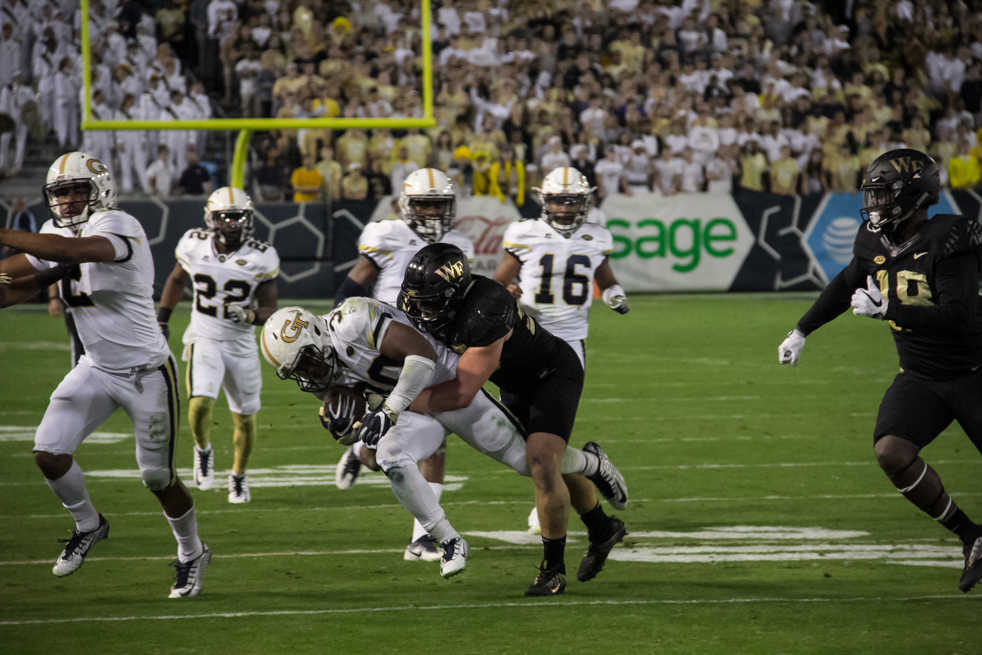There’s this old, maybe apocryphal story about men sentenced to die by combat in Roman times. In the center of the arena, they would look up to the emperor, who was watching the proceedings, and they would say, “Ave Imperator, morituri te salutant.”
Hail, Emperor. Those about to die salute you.
We are surely not the first to compare American football to the sport of gladiator fighting, and we will not be the last, but the comparison is still striking. Both are (or were) violent, brutish sports, captivating a national audience, with the competitors putting their bodies and lives on the line to earn fame and fortune.
In the wake of evidence that football is inextricably linked to Chronic Traumatic Encephalopathy (CTE), a degenerative brain disease, one must question the ethics of allowing athletes to put themselves in such harm.
In today’s day and age, we consider the practices of the Romans — using slaves and prisoners to stage mock battles to the death for entertainment — as nothing short of barbaric. But given football’s brutal history, perhaps assuming such a stance makes us nothing but hypocrites.
In spite of advancements of technology in safety equipment for football players since the sport began, football is still deadly to those who play it. Players don’t die a brutal, gory death on the battlefield, as in Roman times; instead, they succumb quietly to neurological trauma years afterward.
So, we are confronted with the dilemma: what can we do with the sport that so many enjoy so much? Fall Saturdays in the South are based almost ritualistically around football. The Super Bowl is the most watched sporting event in the United States every single year, without fail. Entire television networks have round the clock coverage of nothing but football. But we cannot, try as we might, have football without the traumas that players must incur.
But football differs greatly from the gladiatorial sports of the past in that the players willingly participate in this activity. They are rewarded handsomely, and they can walk away at any time — indeed, many have. Ravens lineman John Urschel once said that, despite the dangers football poses to him, that he played “because [he] loves the game” in an op-ed at ThePlayersTribune.com.
“There’s a rush you get when you go out on the field, lay everything on the line, and physically dominate the player across from you,” Urschel wrote. That is why many still play today (though Urschel retired earlier this year after another CTE report emerged).
It’s a risk that players assume, and they must ask themselves whether or not the payouts, the fame and the fortune are worth the long-term risks.
When bowl season rolls around this year, we’ll be watching. From the GOBUYMEFLOWERS.com Pink Carnation Bowl (we’re only slightly kidding) to the national championship, we will witness every moment.
We will cheer for the insane catches, we will groan as we watch safeties lay crushing hits on receivers who have the temerity to cross the field, we will laugh as red-faced coaches sputter out arguments with nonplussed referees.
But maybe we will watch it all with a heightened sense of appreciation for the sacrifice these players are making — not just of time and opportunity cost but of their bodies. Maybe we will remember that the athletes we chide for dropping passes (or lambast for missing a key block) are doing us a great service.
After all, no one is forcing you to turn the channel to ESPN or spend hours watching highlights. In the case of college football, the 22 men on the field at any given point are earning a combined zero dollars for their play. The least we can offer them is some gratitude, isn’t it?
Morituri te salutant. Those about to die salute you.
No, football players are not gladiators, no matter how many are knocked unconscious on the field of play, how many suffer from brain injuries or how many give up their physical primes for their dreams of being great and for our entertainment. It’s a voluntary pursuit in which these young men so boldly partake.
But in the ways that matter, how big is the difference, really?
